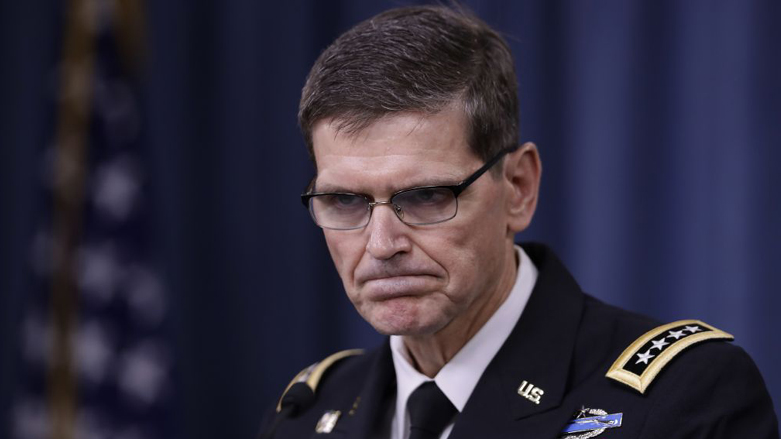US General accuses Iranian Commander of 'destabilizing activities’

ERBIL (Kurdistan 24) – A US general on Wednesday described Iran’s Quds Force as the "principal actor orchestrating destabilizing activities" in the Middle East, stating Iranian Commander Qassim Soleimani "bears the responsibility for this."
During a press conference in Washington DC, Army General Joseph L. Votel, Commander of the US Central Command, on the heels of new sanctions against Iran, criticized the Islamic Republic’s destabilizing role in the region, singling out the controversial Iranian commander.
When asked about the presence of Iran and its proxy forces, such as the Lebanese Hezbollah operating in the Golan Heights area of Syria’s southwest border with Israel and Jordan, Votel described it as a “clear example of the destabilizing behavior that Iran pursues in the region.”
“They are attempting to move advanced capabilities into places where they can threaten Israel or, potentially, other countries in the region,” Votel said.
“This, you know, is – I think, provocative, and I think it is putting countries in the region, Israel, in a position where they have to defend themselves,” Votel argued. The American general noted the US does not have a military presence in the south-western part of Syria, which is occupied by Syrian regime, Russian, and Iranian forces fighting rebels and Islamic State (IS) pockets of resistance.
When asked about the Iranian Revolutionary Guard Corps’ (IRGC) operations, however, Votel singled out the Quds Force and its leader, Qassim Soleimani, as the “principal threat” stoking instability in the Middle East.
“I do think he is an individual who is perpetrating a lot of this destabilizing activity, his very aggressive nature, and, you know, wherever you see Iranian activity, you see Qassim Soleimani, whether it is in Syria, whether it is in Iraq, whether it is in Yemen.”
The US and Iran have been engaged in a war of words over the past few weeks as the Trump administration ramped up economic sanctions on Iran. In response to the sanctions and Washington’s strong stance against the Iranian regime, Soleimani threatened the US.
“We are near you, where you can’t even imagine ... Come. We are ready ... If you begin the war, we will end the war,” Tasnim news agency quoted Soleimani as saying in July. “You know that this war will destroy all that you possess.”
US Secretary of State Mike Pompeo was the first US official to acknowledge the role of Soleimani in an attack on the US-allied Kurdish Peshmerga forces in Kirkuk last October, led by Iranian-backed militias. Last month, however, Pompeo took a stronger stance, telling The National, “Soleimani is causing trouble throughout Iraq and Syria, and we need to raise the cost for him,” for “his organization and for him personally.”
Experts and officials have long warned of Tehran’s push to establish a corridor to the Mediterranean through Iraq and Syria, taking advantage of armed conflicts in the two vulnerable countries. However, the US and Iran have avoided any full-fledged confrontation so far.
